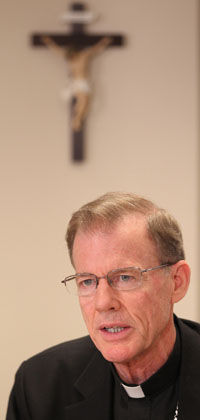Bishop John C. Wester of the Diocese of Salt Lake City, who is chairman of the U.S. bishops’ Committee on Communications, provided Catholic News Service with the following column Sept. 16.
***
Increasingly, Americans now use the Internet for almost every aspect of their lives, and that means more than only downloading videos to entertain. We use the Internet to find employment; get, share and create news; take care of our health; take part in formal education and sate our curiosity about many things outside of formal education; engage in political activity and interact with our governments; organize ourselves and band together for support and fellowship; and even seek spiritual insights and support of our faith.
It is almost impossible for anyone who is trying to improve her life or to contribute to her community, to do so without access to the Internet. Knowledge is power, and for the marginalized, denial of Internet service often means being made even more powerless.
The Pew Research Internet Project reports that 87 percent of Americans use the Internet, with near saturation usage among those living in households earning $75,000 or more, young adults ages 18-29, and the college-educated. While our workplace usage hasn’t changed significantly in the past 15 years (44 to 41 percent), digital activity outside of the workplace has become almost universal.
With that in mind, it seems clear that access to the Internet is as essential and necessary for Americans as is access to education, news and other services that allow us to flourish and make positive contributions to society.
[hotblock]
The Federal Communication Commission’s recent interest in creating a “two-tiered” Internet will impair for many Americans this basic need — fast, reliable access to all Internet content. Instead of adopting rules that permit the wealthiest companies to purchase the best service, the FCC should insist on fair treatment for everyone no matter our income.
Community-serving organizations — such as the church — should not be treated as secondary “customers” in this digital environment. The content and connections we provide to people are more important than entertainment content — such as movies and television shows — even though we don’t have the resources to compete with entertainment companies to pay more to the Internet providers.
Nonprofits rely on the Internet to strengthen their human networks. They use digital platforms to raise money, to mobilize advocacy work, to alert people of dangerous situations, to connect loved ones, to educate children and adults and to provide charitable and humanitarian aid.
Allowing some Internet content to be favored because of its greater ability to pay could result in an even greater divide between the powerful and the rest of a community. Under that scenario, decisions regarding access to public information, the ability to organize, and other first amendment rights, would be determined based only on the bottom line of corporations, not to promote the common good.
The World Wide Web is an international treasure of information, creativity and human potential. It should be preserved and protected by regulation as a place that fosters the best in humankind. The FCC needs a better vision of what the Internet is and what it can do.
***
The views or positions presented in this or any guest editorial are those of the individual publication and do not necessarily represent the views of CatholicPhilly.com, Catholic News Service or the U.S. Conference of Catholic Bishops.




Share this story